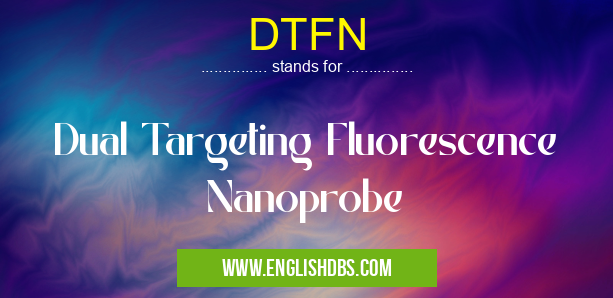What does DTFN mean in UNCLASSIFIED
DTFN stands for Dual Targeting Fluorescence Nanoprobe. It is a type of imaging agent used in biomedical research and clinical applications. DTFNs are designed to specifically target two different molecular markers or receptors on cells or tissues, enabling more precise and sensitive imaging.

DTFN meaning in Unclassified in Miscellaneous
DTFN mostly used in an acronym Unclassified in Category Miscellaneous that means Dual Targeting Fluorescence Nanoprobe
Shorthand: DTFN,
Full Form: Dual Targeting Fluorescence Nanoprobe
For more information of "Dual Targeting Fluorescence Nanoprobe", see the section below.
Introduction: DTFN - Dual Targeting Fluorescence Nanoprobe
Key Features and Applications of DTFN
- Dual Targeting: DTFNs are engineered to simultaneously bind to two distinct molecular targets, increasing specificity and reducing background noise in imaging.
- Fluorescence Imaging: DTFNs incorporate fluorescent dyes or labels that emit light at specific wavelengths, allowing for real-time visualization and tracking of target cells or tissues.
- Biomedical Applications: DTFNs are used in a wide range of biomedical applications, including:
- Cancer imaging and diagnostics
- Cell tracking and lineage tracing
- Drug delivery and monitoring
- Gene expression analysis
Advantages of DTFN
- Enhanced Specificity: Dual targeting reduces off-target binding and improves the signal-to-noise ratio in imaging.
- Multiplexing Capabilities: DTFNs can be engineered to target multiple markers simultaneously, providing more comprehensive information about cell populations and tissue interactions.
- Versatile Platform: DTFNs can be customized to target a variety of molecular targets, making them adaptable to different research and clinical needs.
Essential Questions and Answers on Dual Targeting Fluorescence Nanoprobe in "MISCELLANEOUS»UNFILED"
What is a DTFN (Dual Targeting Fluorescence Nanoprobe)?
A DTFN is an advanced nanoparticle platform designed to selectively target and image specific biological structures within cells or tissues. It combines two targeting mechanisms to enhance specificity and accuracy in biomedical applications. By precisely directing the nanoprobe to the desired location, DTFNs offer improved diagnostic and therapeutic potential.
How does a DTFN work?
DTFNs utilize two distinct targeting approaches: active targeting and passive targeting. Active targeting involves functionalizing the nanoprobe surface with ligands or antibodies that specifically bind to receptors on the target cells or tissues. Passive targeting relies on the enhanced permeability and retention (EPR) effect, where nanoparticles accumulate in areas with compromised blood vessels, such as tumors. By combining both strategies, DTFNs achieve highly specific and efficient delivery to the target site.
What are the advantages of using DTFNs over conventional probes?
DTFNs offer several advantages over traditional probes:
- Enhanced specificity and accuracy due to dual targeting mechanisms
- Improved signal-to-noise ratio for clearer imaging
- Increased penetration depth and target penetration efficiency
- Multimodal imaging capabilities for versatile applications
- Potential for theranostic applications, combining diagnostics and therapy
What are the applications of DTFNs?
DTFNs have broad applications in biomedical research and clinical practice, including:
- Cancer imaging and diagnosis
- Targeted drug delivery and therapy
- Biomarker detection and quantification
- Tissue engineering and regenerative medicine
- In vivo imaging for disease monitoring and treatment evaluation
Are DTFNs safe for use in humans?
The safety of DTFNs is dependent on various factors, including the specific design, materials used, and intended applications. Extensive safety evaluations, including toxicity studies and biocompatibility assessments, are typically performed to ensure the safe use of DTFNs in clinical settings. Regulatory approval processes are also required to demonstrate safety and efficacy before human applications.
Final Words: Dual Targeting Fluorescence Nanoprobes (DTFNs) are advanced imaging agents that offer enhanced specificity, sensitivity, and multiplexing capabilities. They are valuable tools for biomedical research and clinical applications, enabling more precise and detailed visualization of cellular processes and molecular interactions.
